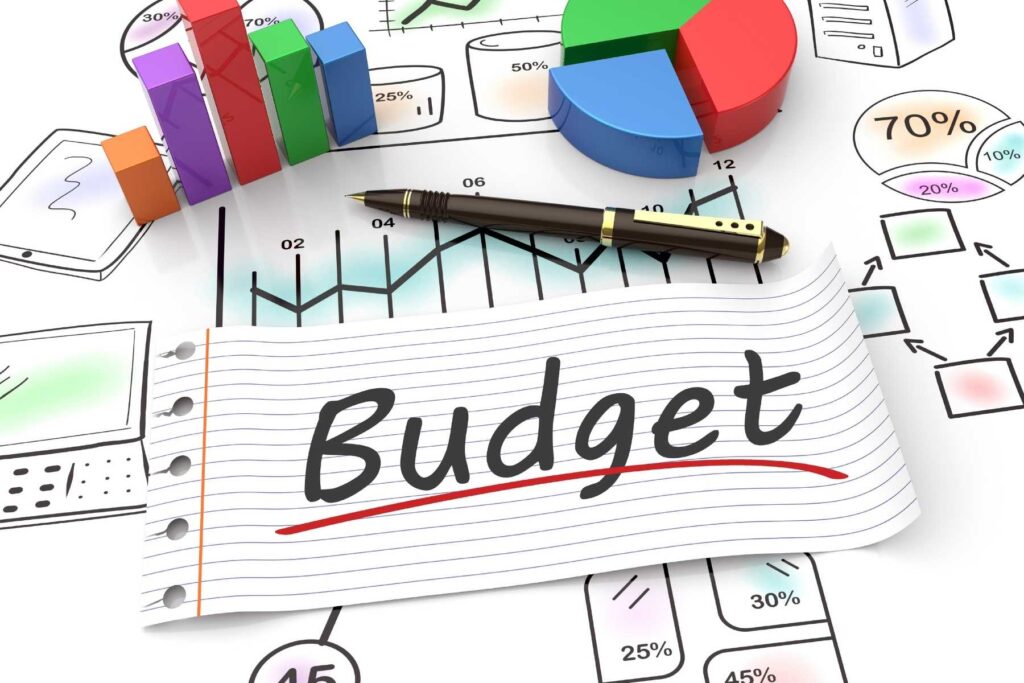Even if you feel like you’re doing okay financially, there’s always room for improvement. Here are a few easy ways to get your finances in better shape and start saving more money.
Apply these tips and you’ll be on your way to a more secure financial future!
How To Transform Your Finances For Good – The Overview:
1. Make a Budget
One of the first steps you need to take in order to transform your finances is to create a budget. A budget is a tool that will help you track your income and expenses so that you can make informed decisions about your spending. There are a number of different ways to create a budget, but one of the simplest methods is to use a spreadsheet or budgeting software.
2. Track Your Spending
Once you have created a budget, it is important to start tracking your spending. This will help you identify areas where you are overspending and give you insight into your spending habits. There are a number of different ways to track your spending, but one of the simplest methods is to use a personal finance app or website.
3. Cut Unnecessary Expenses
Once you have identified areas where you are overspending, you can start cutting unnecessary expenses. This may include canceling subscriptions, eating out less often, or cutting back on unnecessary luxuries. By cutting unnecessary expenses, you can free up more money to save or invest.
4. Boost Your Income
If you want to transform your finances, it is also important to boost your income. There are a number of different ways to do this, but one of the simplest methods is to ask for a raise at work. You can also boost your income by starting a side hustle or looking for new employment opportunities.

5. Invest in Yourself
Investing in yourself is one of the best ways to transform your finances for the long term. This may include taking courses or investing in tools that will help you boost your income or improve your financial literacy. By investing in yourself, you can set yourself up for success both now and in the future

Ways To Increase Your Credit Score
1. Check your credit report for errors
One of the first things you should do if you want to improve your credit score is to check your credit report for any errors. Errors on your credit report can lower your credit score, so it’s important to make sure that all of the information on your report is accurate. You can get a free copy of your credit report from each of the three major credit reporting agencies once per year or you can request a free credit report online here.
2. Make all of your payments on time
One of the most important things you can do to improve your credit score is to make all of your payments on time. Payment history is one of the biggest factors that goes into determining your credit score, so it’s important to keep up with your payments. Set up automatic payments if you can so that you don’t have to worry about forgetting to make a payment.
3. Keep your balances low
Another factor that goes into determining your credit score is how much of your available credit you are using. This is known as your “credit utilization ratio” and it should be below 30% in order to have a good credit score. So, if you have a credit card with a $1,000 limit, you should keep your balance below $300 in order to maintain a good credit score.
4. Use different types of credit
Credit mix is another factor that goes into determining your credit score. Having different types of credit (such as a mortgage, car loan, and credit card) can actually help to improve your score because it shows that you can handle different types of debt responsibly. So, if you only have one type of credit account, consider opening another type in order to help improve your score.
5. Keep old accounts open
If you have old accounts that you no longer use, it’s actually best to keep them open rather than closing them. This is because length of credit history is a factor that goes into determining your score—so the longer you have an account open, the better it is for your score. Additionally, closing an account will lower the amount of available credit you have, which could increase your credit utilization ratio and negatively impact your score.
How to Dispute a Credit Error on your credit report
1. Get in touch with the creditor
If you believe that there is an error on your credit report, the first step is to get in touch with the creditor. You can do this by sending a certified letter to the creditor’s address listed on your credit report. In the letter, you should include your name, address, and phone number, as well as a brief description of the error.
2. Include documentation
When you write to the creditor, be sure to include any documentation that you have that supports your claim. This could include a copy of your credit report, bank statements, or other financial documents. The more evidence you have, the better chance you have of getting the error corrected.
3. Keep a copy of everything
As you go through the process of dispute an error on your credit report, it’s important to keep a copy of everything. This includes all letters that you send and receive, as well as any documentation that you submit. This will help to ensure that you have a paper trail in case you need to take further action.
4. Follow up
Once you have sent your letter to the creditor, it’s important to follow up with them to make sure that they received it and are working on correcting the error. You can do this by calling them or sending another letter. If you don’t receive a response within 30 days, you can file a complaint with the Consumer Financial Protection Bureau (CFPB).
5. Check your credit report again
Once you have followed all of the steps above, it’s important to check your credit report again to make sure that the error has been corrected. If it has not been corrected, you can take additional steps, such as filing a complaint with the CFPB or contacting an attorney.
Negotiate A Higher Salary At Work
1. Do your research
Before you begin negotiating your salary, it is important to do your research and find out what the average salary is for your position in your area. This will give you a good starting point for negotiations and will help you to avoid asking for too little or too much. There are a number of resources that you can use to find out the average salary for your position, including online job boards and salary calculators.
2. Know your worth
In addition to knowing the average salary for your position, it is also important to know your own worth. Consider your experience, skills, and education when determining how much you should be paid. If you have a lot of experience or specialized skills, you may be able to command a higher salary than someone who is just starting out in their career.
3. Prepare for the negotiation
Once you have an idea of what you should be paid, it is time to start preparing for the negotiation itself. Begin by thinking about what you want to say and how you want to say it. It is also important to anticipate any objections that your employer may have and have responses ready. Practice role-playing with a friend or family member so that you feel confident going into the negotiation.
4. Make the first offer
When it comes time to actually negotiate your salary, it is generally best to make the first offer. This allows you to set the tone for the negotiation and put yourself in a position of power. Start high, but be realistic – if you ask for too much, your employer may counter with an offer that is too low.
5. Be prepared to compromise
It is important to remember that salary negotiations are not always black and white – there is often room for compromise. If your employer counters with an offer that is lower than what you were hoping for, be prepared to negotiate until you reach an agreement that is acceptable to both parties.

Start A Side Hustle to Make Extra Money
1. What is a side hustle?
A side hustle is a way to make money outside of your full-time job. Side hustles can be a great way to earn extra income, gain new skills, and even turn into a full-time business. There are a number of different ways to start a side hustle, and the best option for you will depend on your interests and skills.
2. Why should you start a side hustle?
There are a number of reasons why you might want to start a side hustle. If you’re looking to make extra money, a side hustle can be a great way to do that. You can also use a side hustle to gain new skills or experience in a particular area. And if you’re looking to eventually start your own business, a side hustle can be a great way to get started.
3. How to find the right side hustle for you?
Not sure what kind of side hustle is right for you? There are a few things to consider when choosing a side hustle. First, think about what kinds of things you’re interested in and what skills you have. You’ll also want to consider how much time and effort you’re willing to put into your side hustle and how much money you’re hoping to make. Once you’ve considered these things, you can start narrowing down your options and choosing the right side hustle for you.
Click Here To Find Out The Best Ways To Make Money During A Recession
4. How to get started with your side hustle?
Once you’ve chosen the right side hustle for you, it’s time to get started! Depending on the type of side hustle you’ve chosen, there are different things you’ll need to do to get started. For some types of businesses, you may need to get licensing or permits before getting started. For other types of businesses, such as freelance writing or graphic design, you may just need to create an online portfolio or website showcasing your work. And for some types of businesses, such as dog walking or home cleaning, all you need to do is start advertising your services and finding clients!
There are so many ways to create your own business or side hustle – the options are endless!
5. Tips for making your side hustle successful
Once you’ve gotten started with your side hustle, there are a few things you can do to help ensure its success. First, be sure to set aside enough time each week to work on your business; if it’s something that can only be done on weekends or evenings, make sure to schedule that time in advance so that it doesn’t interfere with your full-time job or other obligations. Additionally, be sure to keep track of your finances and expenses; this will help ensure that your business is profitable and sustainable in the long-run. Finally, don’t be afraid to ask for help when needed; there are plenty of resources available (including books, websites, and even courses) that can teach you everything from marketing tips to financial management strategies.
Create A Realistic Budget and Stick To It
1. Know your income
The first step to creating a realistic budget is to know your income. This includes all sources of income, such as your salary, investments, and any other forms of income. Once you know your income, you can start to allocate funds towards different expenses.
2. Know your expenses
The next step is to know your expenses. This includes both fixed expenses, such as your rent or mortgage, and variable expenses, such as your groceries or entertainment. Knowing your expenses will help you to better understand where you can cut back in order to save money.
3. Make a budget
Once you know your income and expenses, you can start to create a budget. A budget is a plan that allocates funds towards different expenses. When creating a budget, be sure to include both fixed and variable expenses. Additionally, be sure to leave some room for unexpected expenses that may come up throughout the month.
4. Stick to your budget
Once you have created a budget, it is important to stick to it. This means being mindful of your spending and making adjustments as necessary. If you find that you are consistently overspending in one area, consider cutting back in that area or finding ways to save money elsewhere.
5. Review your budget regularly
It is also important to review your budget regularly. This will help you to ensure that you are still on track and that there have been no changes in your income or expenses. Additionally, reviewing your budget regularly will help you to make any necessary adjustments so that you can continue to stick to it.
You deserve to be able to live the life you want and not worry about money. But in order to get there, you have to take charge of your finances now. The steps we’ve outlined above will help guide you on your journey to better financial health. So what are you waiting for? Get started today!
The Ultimate Guide To Side Hustles: How To Make Money and Get Out of Debt
How Can I Make Money From Home? – Easy Ways To Make Money From Home

Erika Finn, founder of Stacking Acorns, is an attorney who graduated from law school at University of California, Berkeley. She was a member and editor of the California Law Review and won the Prosser Prize for Legal Accounting. She holds a Master’s Degree from the University of Southern California (USC) and a Bachelor’s degree from Indiana University- Bloomington. Stacking Acorns is a personal finance website for women by women. We help mid-life women achieve financial freedom through real estate investing and other streams of passive income.